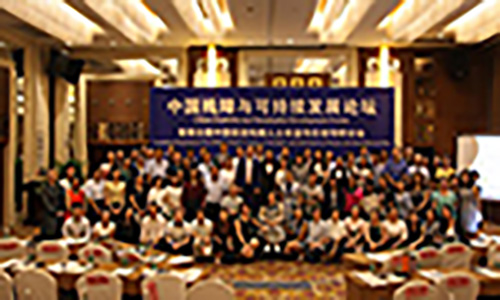

The two-day 12th G20 Summit is expected to start in Hamburg, Germany on July 7. Analysts believed that the consensus reached last year in Hangzhou, China will continue to lead global economy forward since this year’s meeting will follow and translate those constructive proposals into actions.
This year’s summit came as the global economy is showing inspiring momentum. The International Monetary Fund (IMF) forecasts the growth rate of the global economy at 3.5 percent this year and 3.6 percent next year, both higher than previous prediction.
Analysts pointed out that if the anticipation comes true, all the G20 members will report the first-ever positive economic growth this year.
“Last year’s G20 Summit in Hangzhou was held amid a sluggish global economy and rising protectionism. At that time, people around the world felt pessimistic about global economic recovery and were worried about the lack of an effective way to solve that problem,” said Gu Qingyang, an associate professor of the Lee Kuan Yew School of Public Policy at National University of Singapore.
“The China-led Hangzhou consensus offered a slew of measures and policies to facilitate global economic recovery and pursue inclusive and sustainable development, providing solutions for global economic growth,” Gurecalled.
In light of prominent problems faced by the world economy, Chinese President Xi Jinping came up with an initiative of jointly building an innovative, open, interconnected and inclusive world economy during the G20 Hangzhou Summit.
The core and essence of the initiative is to take innovation as the driving force, follow the path of opening up, uphold the spirit of interconnection and pursue the goal of inclusiveness, so as to let growth and development benefit all countries and their peoples.
“The great deal of consensus reached at the Hangzhou Summit injected new impetus into the steady recovery of global economy,” said Duncan Freeman, senior research fellow with the Brussels Academy for China and European Studies.
Since the beginning of this year, the Chinese economy has maintained a momentum of steady and sound growth as a continuation of the second half of last year. In the first quarter, the country’s GDP increased by 6.9 percent, kicking off the year with a positive opening.
Freeman believes such a strong performance of China’s economy serves as a persuasive proof that the future of the global economy will be bright as well.
Many experts think China’s proposals, either the vigorously promoted supply-side structural reform or the Belt and Road initiative that is constantly being pushed forward around the world, are all delivering a positive signal to the international community and bracing up confidence in global market.
The international balance of power has changed and the current global economic governance pattern is very much outdated, said ZivadinJovanovic, president of the Belgrade Forum for a World of Equals based in Belgrade of Serbia.
President Xi also once called for an equitable and efficient global financial governance to uphold the overall stability of the world economy.
German Chancellor Angela Merkel noted that the theme and results of the Hangzhou Summit are echoed by the vision of the Hamburg Summit and Germany will commit itself to implementing related action plans.
George N. Tzogopoulos, a scholar of international studies at the European Institute in Nice, France, said the Hamburg Summit comes down in one continuous line with the Hangzhou Summit.
Lots of constructive concepts put forward at the Hangzhou Summit will again be mentioned at the Hamburg Summit and will be turned into action plans, the scholar told the People’s Daily.
The theme of the G20 Hangzhou Summit reflected China’s scientific outlook about the sustainable development of global economy. China, through the Hangzhou Summit and the Hamburg Summit, has not only demonstrated its power to continuously guide global economy but also shared its wisdom about building a more just and reasonable system for global economic governance, he pointed out.
 Magnificent view of Nansha Islands in South China Sea
Magnificent view of Nansha Islands in South China Sea Aerial view shows scenery in Hong Kong
Aerial view shows scenery in Hong Kong China builds world’s first offshore fish farm
China builds world’s first offshore fish farm A Foreigner's Chinese Dream and Love for China
A Foreigner's Chinese Dream and Love for China 5,000-year-old Chinese beer recipe goes down a storm in US
5,000-year-old Chinese beer recipe goes down a storm in US World's first driverless rail transit system unveiled in Hunan
World's first driverless rail transit system unveiled in Hunan World's largest cluster of Miao villages in Guizhou
World's largest cluster of Miao villages in Guizhou Daily life in Kashgar, China's Xinjiang
Daily life in Kashgar, China's Xinjiang Top 10 Chinese tech and engineering marvels
Top 10 Chinese tech and engineering marvels Top 10 most sustainable cities in China
Top 10 most sustainable cities in China Top 10 European patent applicants in 2016
Top 10 European patent applicants in 2016 The power of 'She' in China
The power of 'She' in China Seven most beautiful art museums in China
Seven most beautiful art museums in China China-NK Q1 trade data must be read fairly
China-NK Q1 trade data must be read fairly Children with disabilities still struggle to access mainstream schools: experts
Children with disabilities still struggle to access mainstream schools: experts Gay fiction bears brunt of new regulations that espouse socialist values
Gay fiction bears brunt of new regulations that espouse socialist values Mobile gaming industry booming
Mobile gaming industry boomingDay|Week